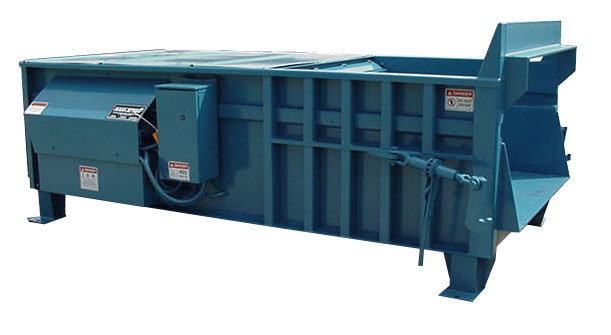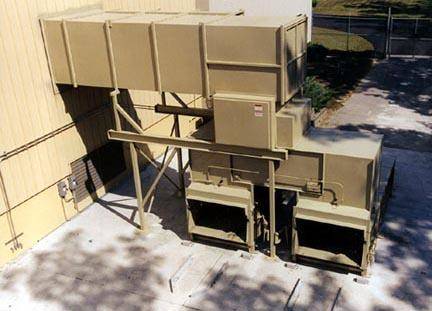How Commercial waste compactor equipment saves costs and enhances workflow
Wiki Article
Comprehending the Different Uses Waste Tools in the Recycling Sector
The recycling sector counts greatly on specialized waste tools to maximize processing and recovery. Each device, from shredders to balers, serves a distinctive objective that enhances total efficiency. Recognizing these functions is necessary for improving sustainability initiatives. Commercial garbage compaction equipment. As innovation breakthroughs, brand-new technologies arise, assuring to transform conventional techniques. This advancement raises vital inquiries concerning the future of waste management and its effect on environmental conservation. What adjustments lie in advance for this critical market?The Duty of Shredders in Product Processing
Shredders play an essential function in the recycling market by successfully processing various kinds of waste materials. These equipments are designed to minimize big items, such as plastics, metals, and natural waste, into smaller, workable items. This size reduction is necessary for subsequent recycling procedures, as it enables much easier handling and sorting. Along with promoting recycling, shredders boost safety and security by lessening the danger of injury connected with handling cumbersome waste things.Furthermore, shredders contribute to environmental sustainability by ensuring that materials are refined in a manner that takes full advantage of source recuperation. They can take care of a diverse series of materials, making them functional devices in waste administration facilities. The effective procedure of shredders not only streamlines the reusing process but also enhances the total efficiency of waste diversion efforts, promoting a round economy. Their significance in material processing can not be overemphasized, as they function as a foundational action in the direction of sustainable waste management practices.

Exactly How Balers Enhance Performance in Waste Monitoring
Balers greatly improve performance in waste administration by condensing various products into bundles, which simplifies storage space and transportation. By pressing recyclables such as cardboard, plastics, and metals, balers significantly lower the volume of waste. This compression not only maximizes area in reusing centers yet likewise lessens the number of trips called for to transport materials, causing reduced gas costs and reduced environmental effect.Moreover, balers add to enhanced security in waste monitoring operations. Portable bales are less complicated to stack and deal with, minimizing the danger of mishaps connected with loosened products. The uniform dimension of bundles permits extra reliable packing and unloading processes, simplifying operations within recycling facilities. Furthermore, balers can enhance the general top quality of recyclables, as correctly compressed materials are less likely to be infected. Overall, balers play a crucial function in enhancing waste administration techniques, promoting sustainability in the reusing industry.
Conveyor Systems: Enhancing the Recycling Refine
Incorporating sophisticated machinery like balers significantly boosts waste administration operations, yet the effectiveness of the recycling procedure is additionally enhanced through using conveyor systems. These systems play a necessary function in the smooth transportation of materials within reusing facilities. By helping with the movement of different waste types, conveyor systems decrease hands-on handling and reduce the threat of contamination during the reusing procedure.In addition, conveyor systems can be personalized to fit the distinct formats and functional needs of recycling facilities. Their capacity to run continuously enables for a consistent flow of products, enhancing efficiency and ensuring that refining and sorting devices obtains a consistent supply.
Furnished with attributes like flexible speeds and automated controls, conveyor systems can maximize the circulation of products, considerably improving general performance (Commercial garbage compaction equipment). These systems are indispensable in modern recycling procedures, adding and streamlining procedures to effective waste management.
Sorting Makers: The Key to Material Recuperation
Arranging devices are important parts in the recycling industry, significantly improving the effectiveness of material recuperation. These devices play a critical function in the splitting up of various recyclable products, permitting a structured procedure that makes the most of source removal. By utilizing sophisticated modern technologies, such as optical sensing units and air classifiers, sorting devices can determine and classify materials based on their size, weight, and composition. This ability assures that steels, plastics, and paper products are successfully separated, minimizing contamination and enhancing the quality of recycled outcome.The procedure of arranging machines significantly decreases the reliance on manual work, which can be both prone and lengthy to errors - Commercial garbage compaction equipment. Furthermore, the automation provided by these equipments speeds up the overall recycling procedure, leading to higher throughput and enhanced operational efficiency. Consequently, arranging Visit Website machines are essential in achieving sustainable waste management goals, allowing the reusing industry to properly visit this site right here recoup valuable materials while lowering landfill reliance

Advancements in Waste Devices for a Sustainable Future
Current developments in waste equipment are driving the reusing market towards a much more sustainable future. Developments such as automated sorting systems, which use man-made intelligence and artificial intelligence, enhance efficiency by accurately identifying and separating recyclables. This leads to higher recuperation prices and reduced contamination. In addition, advancements in condensing technology permit a lot more reliable transport of products, minimizing carbon footprints during transit.In addition, developments in shredding equipment enhance the processing of complicated materials, making it possible for the recycling of items that were as soon as regarded non-recyclable. The combination of eco-friendly energy sources, like solar power, in waste handling centers better contributes to sustainability objectives. On top of that, advancements in waste-to-energy innovations and biodegradable materials are reshaping the landscape of waste management. Collectively, these innovations indicate a transformative shift within the recycling market, promoting not only environmental management yet additionally financial practicality for future generations.
Often Asked Inquiries
What Kinds Of Materials Can Waste Devices Deal With?
The types of products waste tools can manage include plastics, metals, paper, glass, and organic waste. Each devices type is designed for particular materials, optimizing efficiency and performance in sorting and processing different waste streams.Exactly How Commonly Should Waste Tools Be Kept?

Are There Security Worry About Using Waste Equipment?
Safety worry about using waste tools include potential injuries from mechanical breakdowns, exposure to dangerous products, and poor training. Appropriate upkeep, routine examinations, and worker education and learning are crucial to reduce these threats properly in visit our website any kind of setting.What Is the Average Life-span of Recycling Devices?
The typical life-span of recycling devices generally ranges from 10 to 20 years, depending on factors such as use strength, maintenance techniques, and technical developments, which can significantly affect toughness and performance gradually.How Is Waste Equipment Powered in Recycling Facilities?
Waste equipment in recycling centers is typically powered by electricity, though some devices may use alternative energy resources like natural gas or diesel. This power allows effective handling and improvement of materials for recycling purposes.Shredders play an essential role in the recycling sector by efficiently refining different kinds of waste materials. They can deal with a diverse array of products, making them functional tools in waste monitoring facilities. Balers significantly enhance performance in waste administration by compacting various products right into bales, which simplifies storage space and transport. The types of products waste tools can manage consist of plastics, steels, paper, glass, and organic waste. Safety problems with making use of waste devices include prospective injuries from mechanical malfunctions, direct exposure to harmful products, and poor training.
Report this wiki page